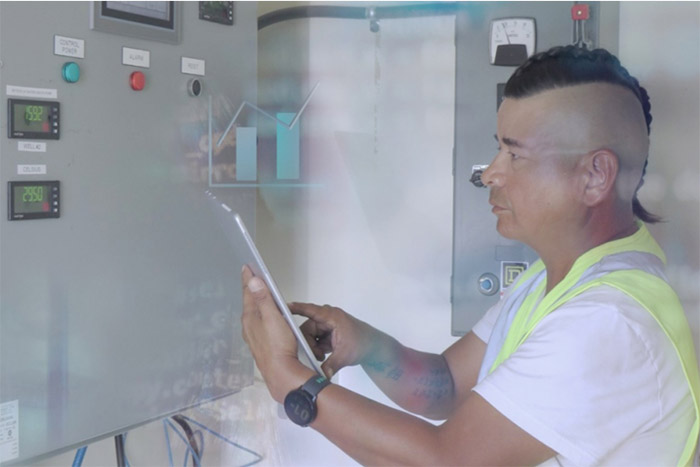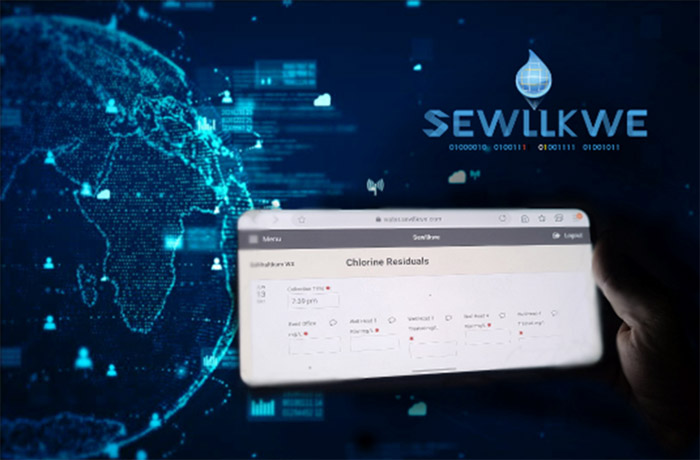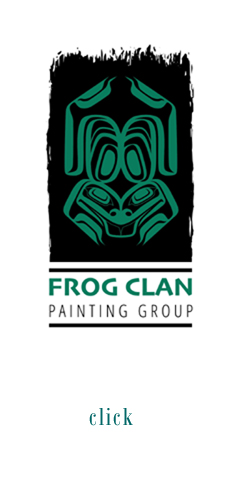|
|

|
  
Features
Update 2020/9/14
Research
ADAMS LAKE, B.C. ENTREPRENEUR DEVELOPS APP TO DRAMATICALLY IMPROVE WATER QUALITY MONITORING & CONTROL, GIVING WATER SOVEREIGNTY TO FIRST NATIONS COMMUNITIES AND BEYOND
By Suzanne Forcese
“When Walkerton hit, I couldn’t believe people in Canada could die from drinking water coming out of a tap. One was a 7-year-old girl. My own daughter was 4 at the time. It hit me hard. I vowed then to do something about it, so that no one would have to die from drinking water.” Trever Andrew, recognized for excellence in the Water and Wastewater Technology Industry with the Victor M. Terry Operator Award.
In British Columbia’s Interior Health Region there are 1,920 different water systems. At any given time 500 of them are under a Boil Water or Do Not Consume Advisory – some date back for years, even decades. The problems have persisted and are particularly acute on First Nations lands.
All this has the potential to change with: One man. One vision. An innovative solution. Thirteen years of intensive research and a 2-year test pilot.
It has all come together for Trever Andrew, member of the Secwepemc (Schuswap) Nation in Adams Lake, British Columbia.
For thousands of years, the people of the Secwepemc Nation called water “Sewllkwe” (pronounced SELL-kwuh). Andrew has created an app called Sewllkwe Book, a digital record of a community’s water that replaces outdated manual systems to record and analyze water. The cloud-based innovative technology ensures a permanent record of drinking water quality and wastewater while providing swift action steps for remediation. All this is do-able on a cell phone or tablet.
WATERTODAY had the pleasure of speaking with Trever Andrew, water technology expert and program design specialist.
“I knew nothing about creating an app thirteen years ago,” Andrew, a graduate of Thompson River University, told us. “I just kept researching and working at it. I am an innovator. But then the real learning curve came with educating myself on the business aspect.”
Working with Thompson Okanagan based software developers, he created, tested and installed a cellular phone-based water management program and app which gives residents and water managers real time information on water quality and usage. It also analyses and reports instantly on trends in water quality data helping to identify water quality issues as they are developing while suggesting solutions.
The app instantly reports the quality of any water being tested – whether it’s tap water, a reservoir, a lake, stream, well water, or aquifer.

Trever Andrew, Founder & Developer of Sewllkwe Book
“I developed the app, then I became a water operator,” Andrew said, after his research took him across Canada where to his dismay he saw many First Nations communities without access to clean drinking water.
Addressing the ‘elephant in the room’, Andrew admits, "I was overwhelmed with the fact that water quality is a political issue,” regarding the obstacles he has encountered in his communications with governments.
“I am not saying this is a cultural issue. It is a water issue. I have lived and worked in both Indigenous and non-Indigenous cultures and am comfortable in both. Water is colour-blind. I love all people on this planet and they have a right to clean water.”
Emphasizing that his work is based on scientific data, not cultural perspective Andrew hopes for a time when governments will support innovation that has the capacity to improve water quality at a fraction of the cost and in less time.
“The biggest teaching of my fused Indigenous and non-Indigenous education in Water is that it taught me not to be a sheep to other ‘experts’. It gave me the confidence to create a solution in today’s broken water hierarchy.”
Currently most water operators collect water samples during the day and then return to the office and manually enter the data into a spreadsheet or other outdated technology and then manually analyze the results.
The process is slow, costly, subject to human error, and delayed results where immediate action is required.
“We all make mistakes. I am not blaming the Government, but just saying that this is not working and maybe we can look at a different way.”
Andrew began digging deeper into B.C.’s First Nations Health Authority and Indigenous Services Canada asking the question “Who owns the data?”
“Governments have a long way to go to identify who has this right. I am just trying to show that the current technology is outdated. It needs to be transparent to the world. What we put into our bodies is serious.”

As soon as a worker takes a water sample and enters it into the Sewllkwe Book app, Sewllkwe Book analyzes the data and generates instant reports or alerts. Real-Time trend reports alert operators to identify issues before they become an expensive problem or a risk to health.
As soon as a worker takes a water sample and enters it into the Sewllkwe Book app, Sewllkwe Book analyzes the data and generates instant reports or alerts. Real-Time trend reports alert operators to identify issues before they become an expensive problem or a risk to health.
“When you give a community their own water data it’s theirs now. That’s sovereignty! It’s something they’ve never had before.”
Andrew’s Sewllkwe Book has done just that for his own Adams Lake community of 300 people.
“I grew up off the reserve. When I came home and saw the water quality, it shocked me. It was heart-breaking.”
The Adams Lake community had been on Do Not Consume and Boil Water Advisories for years.
“A lot of people thought we needed $20 million to fix it with a new water plant. My program gave them the data they needed. When your Chief and Council get to see the data, it opens their eyes to new ideas.
“All they needed to do was extend the water line at a cost of $2.7 million – monies the community raised without government assistance. Investing in their own water program to get them the results they needed – that gave them ownership and authority.”
Adams Lake has now been Advisory Free for almost two years.
With the program ($12 000) every resident can have the app for $4.99 annually which gives them instant alerts. Once residents learned of the quality of their water and how much they were using, they demanded solutions.
The added benefit was that without being prompted, residents found their own solutions as well by fixing leaky pipes, dripping faucets and used 20 million fewer litres of water in one year. “What gets tracked gets managed.”
“Sewllkwe Book is not just for community water systems,” Andrew adds. “It can also be used for watershed management and environmental monitoring for industrial developments such as mines or pipelines. Water quality can also be monitored during or after natural disasters such as forest fires, landslides, or flooding to instantly communicate the condition of the water, getting alerts out to the public quickly.
“We should all be experts in water!” Andrew says. “Not just a handful of people in charge. I want to educate people on what it means to have good/bad water.”
This data could be used to support applications to Indigenous Services Canada or other federal or provincial agencies to help fund water system improvements by showing where money should be spent for maximum benefit at the lowest cost to improve drinking water in communities.
The possibilities and reach are endless.
Andrew is not stopping at drinking water and wastewater. He is also developing a watershed app. “Big Shuswap Lake, a historical lake in B.C. has algae problems. I want to allow everyone to see all the data to detect what is causing the problems.”
Andrew will be using Artificial Intelligence (A.I.), an approach that has not been taken.
“Human beings need help. We have all these experts and we can’t fix the problems. It’s too big. In the last 100 years we’ve all come together from different cultures and we have destroyed that lake.”
“Our whole life is wrapped around water. We’ve educated the public that it is an everlasting resource but we are leaving a mess for the next generation.
“As a young child I knew I wanted to change the world. I did not know then it would be through water. The mess we have created could be killing a future Prime Minster of Canada, or a science researcher that might have found cures for deadly pandemics, or a reporter that could tell that one story that makes a difference.
If I can help save those lives I will.”
suzanne.f@watertoday.ca
|

|
|
|
Have a question? Give us a call 613-501-0175
All rights reserved 2026 - WATERTODAY - This material may not be reproduced in whole or in part and may not be distributed,
publicly performed, proxy cached or otherwise used, except with express permission.
|
| |